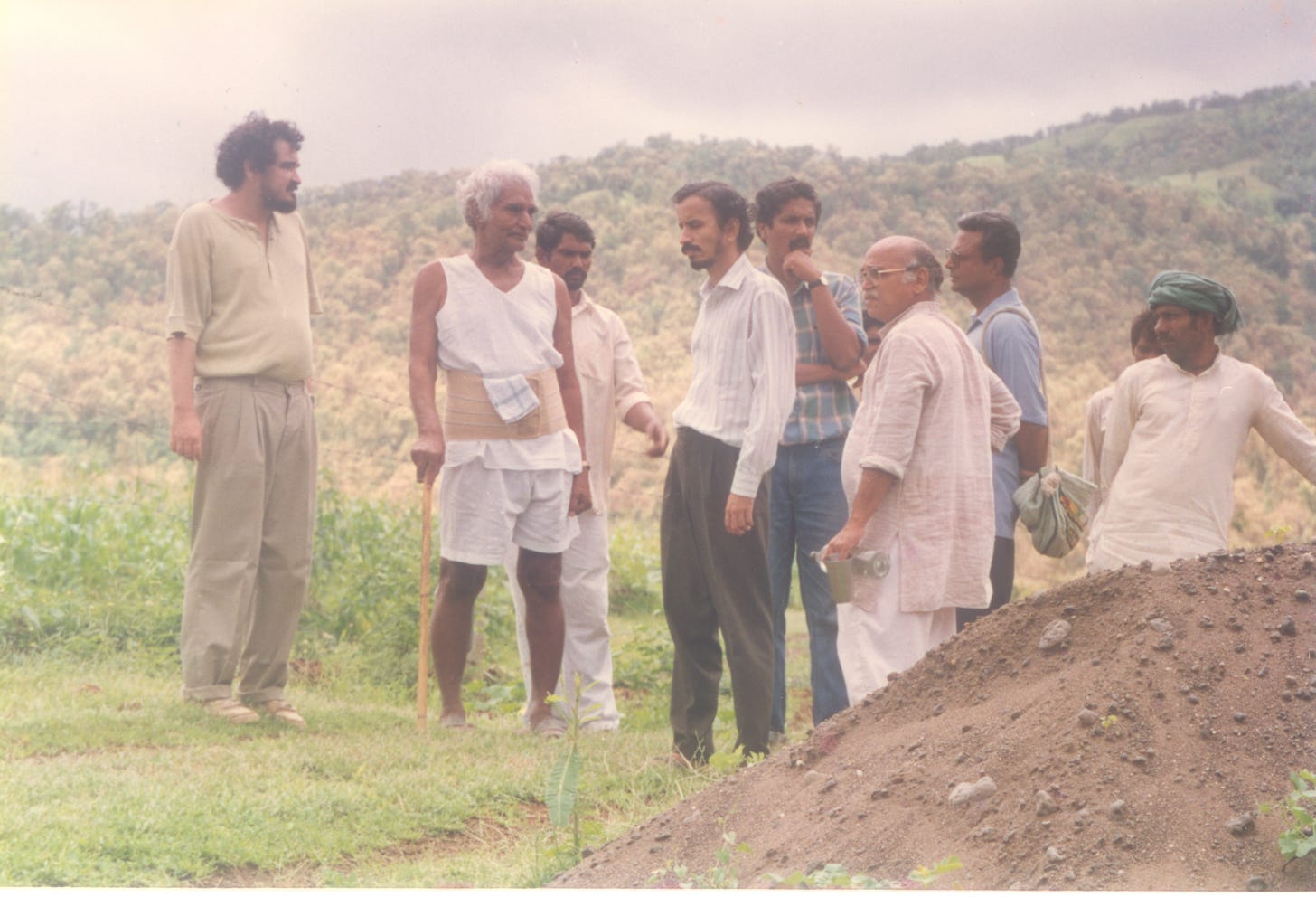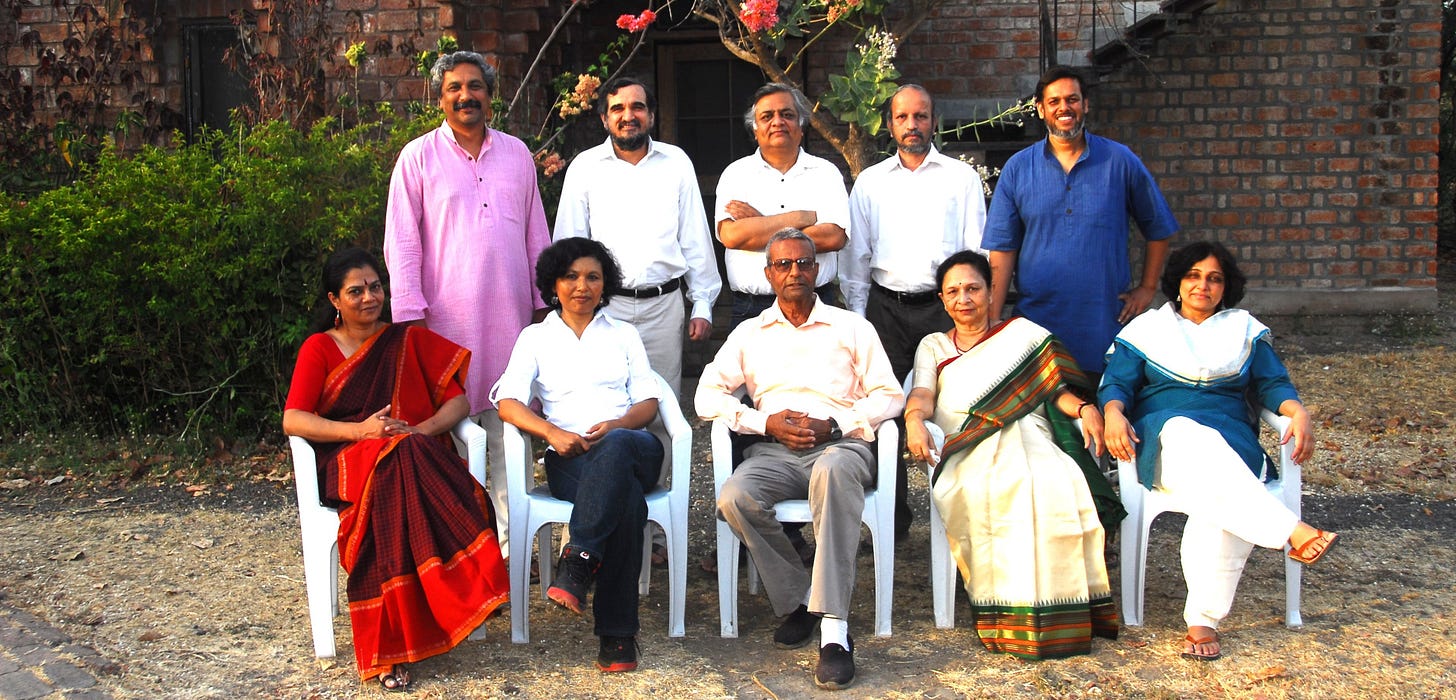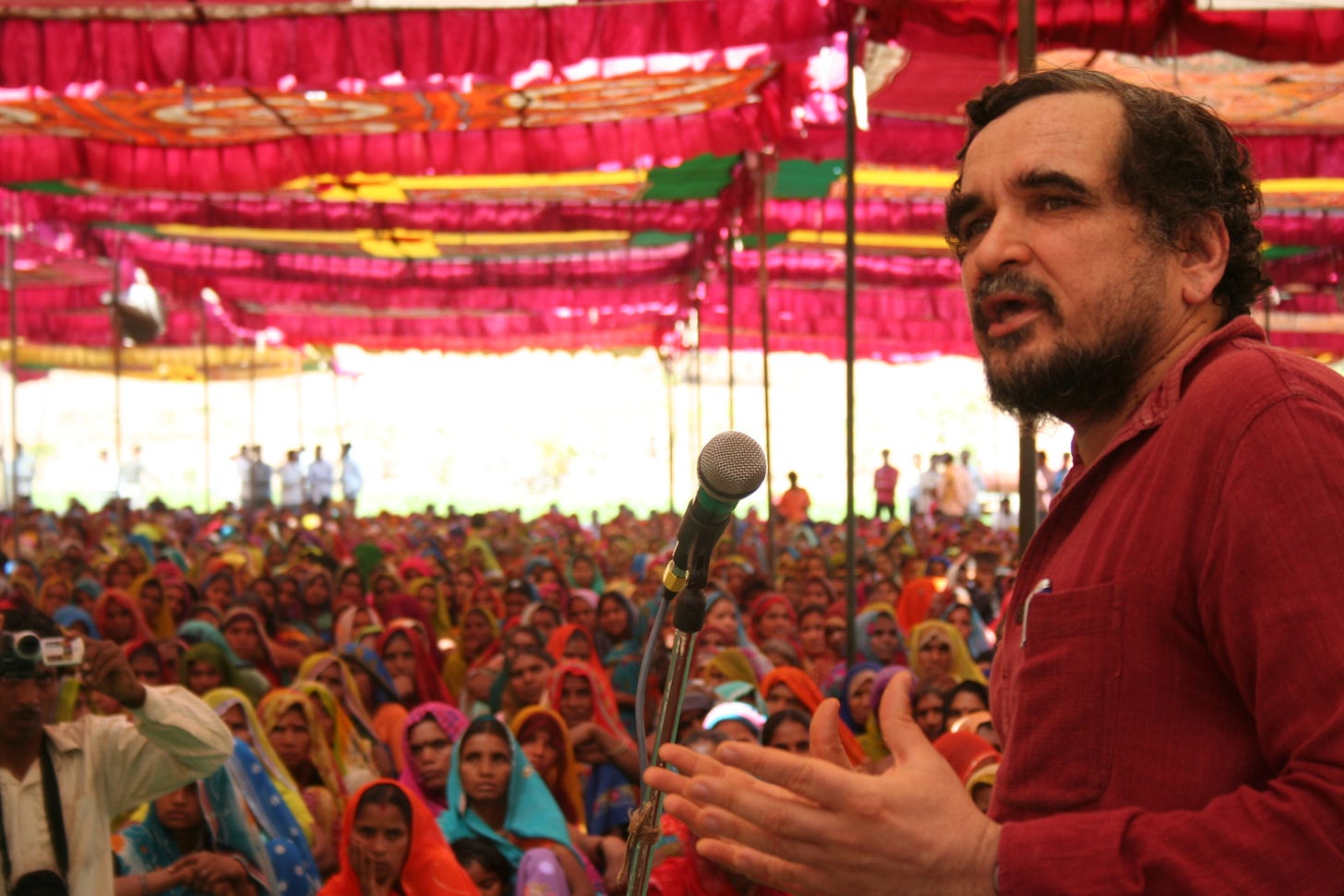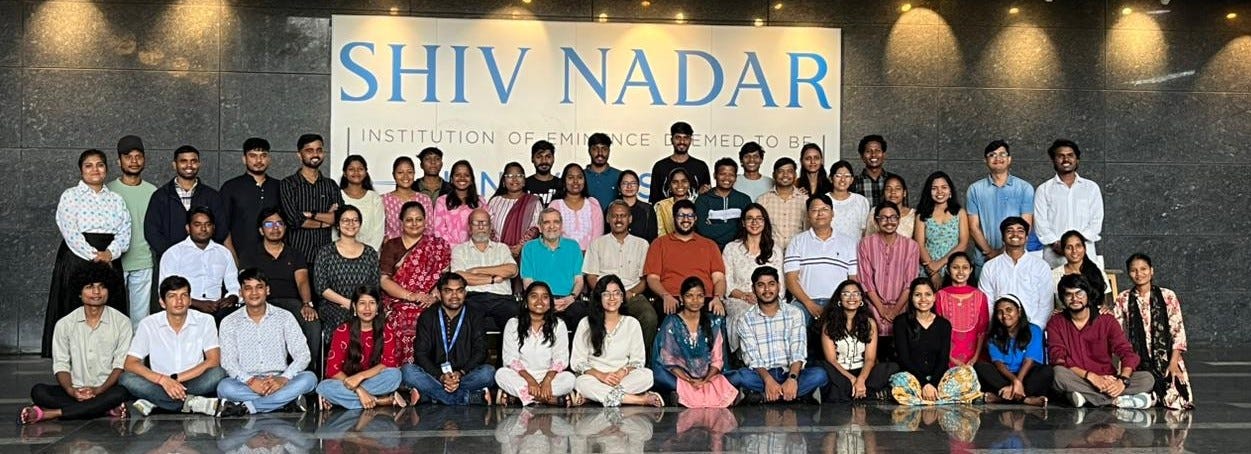How Can India’s Rural Poor Earn Higher Incomes
Co-founder Mihir Shah chats about non-profit Samaj Pragati Sahayog’s work to improve incomes and empower women in rural India
(Photo: Baba Amte, second from left, with founders of Samaj Pragati Sahayog. Mihir Shah at left. 1994. Photos courtesy Mihir Shah.)
October 18, 2025
A GLOBAL INDIAN TIMES INTERVIEW BY CHERIAN SAMUEL* AND IGNATIUS CHITHELEN**
TO LISTEN TO AN AUDIO VERSION CLICK ON GREEN BUTTON BELOW.
Samaj Pragati Sahayog (SPS) pursues development of water resources combined with promoting low-cost, low-risk farming practices, other nature-based livelihoods and women-led microfinance. The goal is to increase incomes of the rural poor and provide them with a way to borrow money at lower interest rates, thereby avoiding the high risk of losing their land and homes to usurious local moneylender-traders.
A non-profit, SPS works with partners across roughly a million acres in 72 districts, mainly in the Adivasi tribal belt in central India. This drought-prone area, with high rates of poverty, illiteracy, infant mortality and suicides, is seeing a major impact from climate change.
One of India’s largest grassroots initiatives, SPS has also played a major role in shaping national policies on watershed management, the rural employment MGNREGA program, National Food Security Act and the Forest Rights Act as well as on the economic and social development of tribal areas.
SPS has a staff of roughly 500, four fifths of whom are local tribals. Its funding comes from several sources including central and state governments, donations by individuals and corporate philanthropies. Major philanthropic donors include the Tata Trusts, Axis Bank Foundation, and the Azim Premji Foundation. Every Rupee invested in an SPS project, to farm both rain-fed and irrigated crops, has a “Social Rate of Return” of 12 Rupees, according to an evaluation by KPMG for the Axis Bank Foundation.
SPS was co-founded by Mihir Shah and eleven friends in 1990. They were inspired by the work of the late social worker Baba Amte (1914-2008), who sought to empower the neglected and marginalized people in India so that they can stand on their own. The SPS program is discussed in a book, written by Shah and colleagues, India’s Drylands: Tribal Societies and Development through Environmental Regeneration, 1998.
Since 2022, Shah has been Chair of the Master’s in Rural Management Program at Shiv Nadar University, Delhi. He joined the university in 2016 as a distinguished visiting professor. A year later, under Shah’s leadership, the university launched an M.Sc. in Water Science and Policy.
From 2009 to 2014, Shah was a member of the Government of India’s Planning Commission, He was mainly responsible for drafting a new plan to manage India’s water resources. As chairman of the Government of India’s Committee for Revision of MGNREGA Guidelines, he initiated a makeover of the largest employment program in Indian history, with an emphasis on rural livelihoods based on productive assets.
Shah, 69-years-old, earned a PhD in economics from the Centre for Development Studies, Thiruvananthapuram, India, in 1984. He received an M.A. from the Delhi School of Economics, 1978, and a B.A. from St. Stephen’s College, Delhi, 1976, both in economics.
In a recent chat with Cherian Samuel and Ignatius Chithelen, Mihir Shah discusses how the work of Samaj Pragati Sahayog is helping improve farmer incomes and empowering rural women, his training a new generation of rural social work professionals and his spiritual motivation.
Global Indian Times: In your recent University of Manitoba lecture, you discussed the SPS programs for water management and rural livelihoods. Are they being adopted by other Indian organizations?
Mihir Shah: Yes, a large number of civil society partners and government officials, from more than 15 states, have come to learn from the work and experience of SPS. We have set up beautiful training facilities for this in the heart of the tribal region in central India where we are headquartered. We have also created easy-to-access training materials, both in written and audio-visual formats, which have been translated into several Indian languages by our partners. We also support our partners on their field locations in the initial years of their work.
We also help draft and implement policies as members and chairs of several government committees. My own role at the Planning Commission provided an opportunity to initiate many changes in programs and policies based on learning from the work of SPS and its partners.
(Photo: SPS founders, 2011. Mihir Shah, standing second from left.)
GIT: In your 2015 TEDx talk, you speak about the “Void between the two Indias”. Anecdotal evidence suggests that the void is widening.
Shah: It is truly ironic and deeply tragic that, since the 1990s, even as India’s economic growth rate has soared, the sense of exclusion among millions has expanded, with inequality touching historic highs and the youth agonizing over massive unemployment. In the same period, more than 400,000 farmers have committed suicide and a Maoist insurgency has raged in tribal areas.
GIT: How does SPS tackle the void?
Shah: We founded SPS in 1990 precisely to try and bridge this void. We went to the roots of this void, which emerges as a natural consequence of the exclusionary and unsustainable model of development India has adopted since Independence in 1947. Our goal is to build together with the tribal communities, under the leadership of women, a new paradigm of inclusive, sustainable and equitable development, which grows organically from the grass-roots.
Before we entered the region, farmers would grow one unirrigated crop, dependent on water from erratic monsoons. They would then migrate in distress to seek work in the neighboring urban areas, many a time never to return to the village. Our work on local water sourcing enables farmers to focus on farming and invest in their land and irrigation facilities, while also diversifying their cropping pattern. I have described this as the operation of a Keynesian multiplier, resembling a model of the economist John Maynard Keynes: accelerator synergy, leading to a virtuous spiral of growth but in a sustainable manner.
So, I am happy to report that wherever SPS has worked, directly or with its partners, there has been a dramatic reduction in unemployment, poverty, and distress migration; also, vast improvement in levels of education, health, water and food security. SPS has helped improve the lives of more than 1,00,000 extremely poor families. We estimate that, over the past 15 years, SPS has helped generate a total of more than Rs. 60 billion ($660 million) in additional income for these families.
GIT: How does the process of generating income and jobs work?
Shah: Our approach is simple: we create a foundation of sustainable water security based on local resources and low-cost solutions which enable farmers to resume farming. At the same time, we guide farmers to move towards a non-chemical and more crop-diverse approach to farming, which helps reduce the cost of cultivation and enhances productivity. A strong farm base income enables diversification into a range of associated farm and non-farm livelihoods which generate both additional employment and incomes.
The farming efforts are supported by a vast network of women’s Self-Help Groups and their federations. They take care of the serious problems farmers face in raising funds, buying seeds and other supplies and selling their farm produce. This collective strength has revolutionized the terms of trade. Imagine the power of thousands of women together going to the market to buy farm inputs and sell farm outputs. It has also transformed the public sector bank branches in our area, who lend money to farmers mainly via local microfinance groups, from loss-making into profit-earning entities because the banks now deal with borrowers who pay back near 100% of their loans right on time.
GIT: In your 2015 TEDx talk, you spoke of SPS as a story of Hope.
Shah: The SPS story is that of a progressively successful civil society effort, which derives its strength from two founding principles:
First, cascading redundancy. The aim from Day One is to make ourselves, the founders, less and less important every passing year. We do this by seeking to build leadership capabilities among the local youth, especially women.
Second, deep engagement with partners, especially government. There is no doubt that much of the pain in ordinary people’s lives in India comes from the actions of the official bureaucracy at all levels. But the answer to that is not less government. It is always better government. This is what SPS work has been most about -- engaging with the government to influence policy and reform the implementation of government programs, with a stronger role for the village panchayats as the bed-rock.
GIT: What led to the founding of SPS?
Shah: A group of angry young women and men who wanted to give meaning to their lives, while living with and learning from those who did not find a place in India’s development story.
GIT: SPS is now 35 years old. What has been its impact?
Shah: The impact has been beyond our wildest dreams. The principles I stated above have enabled a much larger impact than if we had restricted ourselves to mere direct implementation. The partnerships we have forged with Panchayati Raj Institutions, civil society and government have meant that our very small-scale direct implementation work in a tribal pocket of central India has had an impact over hundreds of districts, where our partners work. It has also impacted a range of government programs and policies. All of this has been documented by many independent evaluations and research papers.
GIT: What have been the major challenges SPS has faced and continues to face?
Shah: The initial challenges were from local vested interests, primarily money-lenders and traders, who felt threatened by our work. Today, we have to find creative ways to build more effective women-led local institutions.
(Photo: Mihir Shah speaking at an SPS Women’s gathering, 2009.)
GIT: You are running a Master’s Program in Rural Management at Shiv Nadar University. What does the program hope to achieve?
Shah: One of our main learnings from decades of SPS work is that there is an acute shortage of trained professionals who are needed to expand the impact of our work. So I feel fortunate to have been invited by the university to design a rural management program. Our curriculum and pedagogy are unique. Also, our students come from deeply disadvantaged communities and regions. They have the passion, the commitment and the experience of living in debilitating poverty. I see them as the leaders of a future transformation of rural India.
We started in 2023 and so far, in the three batches, we have had around 40 students each year. You cannot imagine how lively, diverse and rich the classroom is and how much we, the teachers, have been learning from our students.
GIT: Why did you choose to study economics? Any economists that have shaped your thinking?
Shah: While in college, I thought the problems which I was most passionate about solving - poverty, hunger and unemployment - needed a training in economics! Luckily there have been economists such as Nicholas Georgescu-Roegen, Albert Hirschman and Mariana Mazzucato who have kept my faith alive!!
GIT: You earned an MPhil and PhD at the Centre For Development Studies. What was your experience?
Shah: The seven years I spent at CDS were the most formative, happiest years of my life. The friendships I forged there, both personal and intellectual, have since held me in great stead.
GIT: As you reflect on your professional life, what gives you the most satisfaction?
Shah: I feel truly grateful to God for blessing me with this life, which has allowed me to experience the best of so many realms. What gives me the most satisfaction is precisely the fact that starting off from a serious doctoral dissertation, within an amazing academic milieu, I was able to segue into many decades of highly fulfilling civil society work, which became the foundation for my work at the Planning Commission, where I was able to initiate multiple paradigm shifts in policy. Now I am back at a university, which has given me the fullest academic freedom to bring to bear on the MA program all that I have learnt from decades of work in academia, civil society and government, while teaching students who energize me every passing day.
GIT: You place an increasing emphasis on spiritual beliefs. Why?
Shah: It has been my growing conviction that, without an inner transformation, we will not be able to achieve the kind of social transformation we all dream about. You cannot solve a problem from the same level of consciousness that created the problem in the first place. This is the lesson that we learn from the repeated experience of so many movements and revolutions. Indeed, an alternative to capitalism is impossible to conceive if we continue to be enslaved to the kinds of desires that have brought this planet to the brink of destruction. Repression is not the way forward. Real change can only come about through inner transformation for which there are many spiritual practices across traditions that we can experiment with. My spiritual beliefs give me great inner clarity and strength in facing the difficult challenges life has repeatedly thrown up.
(Photo: Students and faculty, Rural Management Program, Shiv Nadar University. 2025.)





